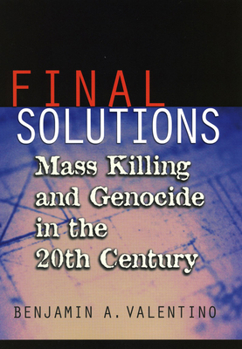Final Solutions: Mass Killing and Genocide in the 20th Century
(Part of the Cornell Studies in Security Affairs Series)
Select Format
Select Condition 
Book Overview
Benjamin A. Valentino finds that ethnic hatreds or discrimination, undemocratic systems of government, and dysfunctions in society play a much smaller role in mass killing and genocide than is commonly assumed. He shows that the impetus for mass killing usually originates from a relatively small group of powerful leaders and is often carried out without the active support of broader society. Mass killing, in his view, is a brutal political or military...
Format:Paperback
Language:English
ISBN:0801472733
ISBN13:9780801472732
Release Date:December 2005
Publisher:Cornell University Press
Length:336 Pages
Weight:1.10 lbs.
Dimensions:0.8" x 6.0" x 9.2"
Age Range:18 years and up
Grade Range:Postsecondary and higher
Customer Reviews
2 ratings
A final solution for "final solutions"?
Published by Thriftbooks.com User , 20 years ago
This book provides an excellent, important study of genocide and similar episodes of mass murder by government of its own people. Valentino classifies mass murder campaigns into six types, of which the most important are Communist, ethnic, and anti-guerrilla (elimination not only of combatants but of all possible supporters thereof, during civil unrest). This somewhat underestimates the world's complexity; fascist regimes, notably, massacred not only Jews and other ethnic groups, but homosexuals, socialists, handicapped persons, mentally ill, dissidents of every sort, and even modernist artists. Still, Valentino's typology, and especially his explanations of it, are useful. Valentino also shows that leaders invoke mass murder when they feel threatened. War, economic collapse, consolidation of the regime, or sheer paranoia can turn a ruling group's minds to mass murder. Conversely, a good growing economy in time of peace seems to mollify even the sourest dictator; he cites China since Mao and the USSR after Stalin, when Mao's and Stalin's lieutenants--often their actual hatchet-men--ran much less bloody governments. The most important argument in the book is that genocide and mass killing are usually invoked by one leader or a very small ruling group. These "final solutions" are not often popular with the masses. This may or may not be true, and will provoke controversy. We have the cases of China and the USSR; but we also have the case of Germany, where anti-Semitic purges had occurred intermittently for centuries. For that matter, Valentino mentions the United States' extermination of many of its Native American groups; this was largely a populist matter, usually without government support (Andrew Jackson's presidency being a notable exception). In the US, as in Brazil and some other countries, millions of people over a couple of centuries carried out genocidal policies. More research is needed! The one real problem I have with Valentino's book is his solution to final solutions. Since it is at least arguably true that mass murder is invoked by a very few leaders, his simple fix is to get rid of the leaders. Sure--but all Germany rallied to Hitler's--or at least Germany's--defense in WWII, and the United States is now learning in Iraq that people often prefer the insane tyrant they know to the alien infidels who might, for all they know, be even worse. The CIA probed China during Mao's day (I know; I was there) and wisely pulled out, for the same basic reason. A thought experiment about what might happen if the US goes into Iran is instructive. I totally agree with Valentino that we should make every attempt to go in and stop genocide and mass killing, and I am nearly persuaded that he is right about the conceptual ease of it. I only wish the world were as simple and logical as he thinks it is. The world could easily have stopped the killing in Rwanda and Burundi, and in Guatemala, but chose not to bother (after all,
Required Reading
Published by Thriftbooks.com User , 20 years ago
Dr. Valentino lays out his thesis, analysis and ultimately his conclusions in a logical and methodical approach that is truly thought provoking. His keen insights and broad knowledge of the material is unparalleled and indisputable. Without political slant or bias, Dr. Valentino's meticulous approach to understanding the horrors of mass killings and genocide lays a firm, new foundation for taking action to prevent these atrocities in the future. This book should be required reading for foreign policy makers around the world.






